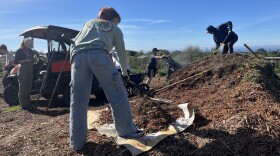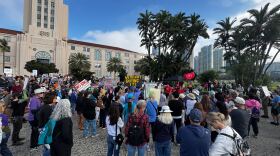A bipartisan group of senators introduced a bill on Thursday that would increase the number of Border Patrol agents.
The Border Patrol Enhancement Act would create a 2,500-agent reserve force and increase Border Patrol pay by 14%.
Here in San Diego, staffing levels are often cited as one of the main reasons behind border wait times.
Long border wait times cost the binational economy billions of dollars every year.
“Even before the pandemic, in 2016, we nearly lost over $2 billion in economic output due to the economic delays,” said Jimena Viiasenor-Martinez, the international business affairs coordinator for the San Diego Regional Chamber of Commerce.
“Since then, wait times for cargo have reached an all-time high of up to six hours, causing California companies to cancel contracts,” she said.
Additionally, long border wait times also have an impact on air quality in border communities — causing high levels of asthma and other health issues that make people more vulnerable to COVID-19, she added.
Vehicle inspection lanes at San Ysidro, the busiest border crossing in the Western Hemisphere, are routinely closed.
Rep. Juan Vargas, D-San Diego, has previously expressed concern about the lack of staffing when the new Otay East border crossing opens. Vargas said he didn’t want taxpayers to pay for a state-of-the-art border crossing only to have lanes closed because of lack of staffing.
The bill would not have a direct impact on the number of staff working at vehicle and pedestrian booths along the border. Instead, the new hires would patrol the areas between the ports of entry.
“This will add Border Patrol staff, but it does not address CBP agents present in our land ports of entry,” Villasenor-Martinez said.
Experts say staffing is just part of the issue.
To make crossing the border more efficient, CBP needs to look into new technologies and methods to optimize mobility, said Gustavo de la Fuente, executive director of the Smart Border Coalition.
“What else is going on other than staffing?” he said. “What’s going on with technology? What’s going on with the way we process people? It’s a process issue sometimes, not just staffing.”
De la Fuente said CBP should look into more ways of prescreening daily travelers to help reduce border wait times.
This issue goes beyond the regional economy, he added.
“When you have the proper mobility between the two countries, it makes a lot of things easier,” de la Fuente said. “And I’m not just talking about business. I’m talking about cultural, family ties and social ties. The possibilities of starting things, whether it’s a business or relationships.”








